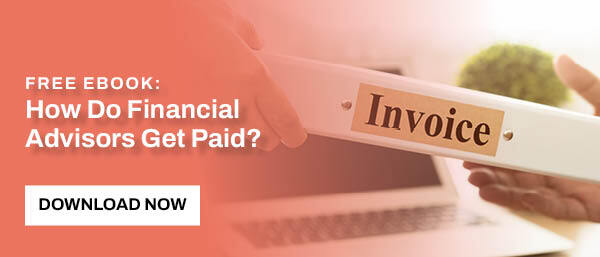Knowing how your financial advisors are paid is critical to building trust between you and the advisor. By clarifying their payment structure, you help to eliminate any potential conflict of interest. This can put you, the client, at ease because you wouldn’t worry about if your advisor is recommending a product for reasons other than your benefit.
In this article, we will go through the most popular payment structures used to compensate an advisor:
- Fee-only
- Fee-based
- Commission-based
Then, we will show you how to find the right advisors and what conversations to establish the initial trust between you and the person who will be managing your assets for you.
Fee-Only Advisors
The fee-only compensation structure rewards the advisor for the client’s success. Essentially, the larger the assets grow, the higher the fees the advisor is paid. The investment products purchased by clients do not affect the advisor’s compensation under the fee-only system. As a result, the advisor can focus on serving the client’s best interests.
Flat Rates, Hourly Fees, and Advisory Fees
There are three primary forms of fee-only payment structures:
- A flat rate per session or “subscription”
- An hourly fee
- An advisory fee
Flat Rate (Subscription)
A flat rate is often charged per service session or as a monthly retainer by the advisor. Think of how you do your tax return each year. Typically, you pay your accountant a flat rate for your regular income tax return.
Flat rates work in a variety of ways, one is a predefined package. Or, you can also discuss a monthly retainer fee with your advisor to cover your usual financial planning needs.
Hourly Rate
The hourly rate has clear pros and cons compared to the flat rate structure. The hourly rate can be costly for the client, especially if they have many things to go through.
However, investment management can be unpredictable, and the last thing you want is your advisor feeling under-compensated. Therefore, the flexibility provided by the hourly payment structure can be favorable for advisors working on more complicated and volatile investment portfolios.
Sometimes, an advisor may also create a flat rate for their regular service packages while charging hourly for additional offerings, such as in-depth quarterly portfolio reviews.
Advisory Fee
Advisors compensated by a fee structure charge a percentage of the managed assets. This means the more your investment grows, the better your advisor is compensated. In other words, the advisor fee structure ties the advisor’s income directly with the client’s portfolio performance.
Advisory fees can vary based on the advisor, since the firm does determine this number independently. These fees are usually processed monthly or quarterly. The percentage can be lower for higher-value accounts.
Fee-Based Advisors
The fee-based advisor is a hybrid between the fee-only and commission-based models. These advisors will typically do most of their business on the fee-only side, collecting agreed upon fees for the services they provide for their clients.
Most of their work is similar to a fee-only advisor with the exception that they will also sell commission based products like life insurance. Although, this is normally secondary to the primary function of these advisors, which is why they are “fee-based” not “commission-based”.
Commission-Based Advisors
Many are skeptical of commission-based advisors because the structure can create a conflict of interest between you and your advisor. While this is a reasonable doubt, it doesn’t mean you must shy away from commission-based financial advisors.
When working with an advisor taking commission, have an open and honest conversation with them. Ask about what parties they take a commission from to address your potential concerns. Also, some Registered Investment Advisors (RIA) may incorporate the commission structure, but their fiduciary status mandates them always to make judgments based on and only on your best interest.
Where to Find Fee-Only Financial Advisors
One way to find a wealth management service provider, whether a registered investment advisor (RIA) or a firm, is the NAPFA database. The National Association of Personal Financial Advisor is a non-profit organization connecting customers seeking wealth management and financial planning services with the right provider.
NAPFA has been referring fiduciary financial advisors for 36 years and holds their advisors to a high standard of ethics and continuing education.
How Much Does a Financial Advisor Charge?
Keep in mind that you’re looking for someone to plan and manage your wealth, and it is no simple task. Investment management requires comprehensive planning, constant monitoring, and critical investment strategies.
Why You Should Talk About Compensation With Your Advisor
Can’t you just get started, then figure out the price issue later? The answer is no.
The world of investment management is complicated. You can explore many forms of investments and various approaches you should take depending on who you are, what you have, and what you want.
You should always have an open and honest conversation with your financial advisor before entering any agreement. By addressing the compensation question upfront, you take the ambiguity and frustration away from the process, so your advisor can focus on managing your wealth. In contrast, you can comfortably disclose all necessary information to help them draft you a game plan.
The Advantage of Humanity Wealth Advisors
Humanity Wealth Advisors was founded by a single governing principle: That the everyday individual is our greatest bottom line. That’s why our team is committed to your success.
Our fee-based services include advice and support tailored to your needs, and we provide guidance in plain, ordinary terms (without all the industry jargon).
With over 20 years of financial experience, we help our clients develop a clear, holistic plan to build their financial futures. When you’re ready to pursue financial planning, contact our team of friendly, reliable professionals.



